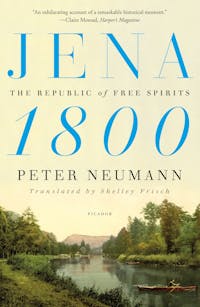Jena 1800
The Republic of Free Spirits
 Download image
Download image
ISBN10: 1250862930
ISBN13: 9781250862938
Trade Paperback
256 Pages
$19.00
CA$26.00
At the turn of the nineteenth century, a steady stream of young German poets and thinkers coursed to the town of Jena to make history. In the wake of the French Revolution and the Napoleonic Wars, confidence in traditional social, political, and religious norms had been replaced by a profound uncertainty that was as terrifying for some as it was exhilarating for others. Nowhere was the excitement more palpable than among the extraordinary group of poets, philosophers, translators, and socialites who gathered in Jena.
This village of just four thousand residents soon became the place to be for the young and intellectually curious in search of philosophical disruption. Influenced by Johann Wolfgang von Goethe, then an elder statesman and artistic eminence, the leading figures among the disruptors—the translator August Wilhelm Schlegel; the philosophers Friedrich Schlegel and Friedrich Schelling; the dazzling, controversial intellectual Caroline Schlegel, married to August; the poet and translator Dorothea Schlegel, married to Friedrich; and the poets Ludwig Tieck and Novalis—resolved to rethink the world, to establish a republic of free spirits. They didn’t just question inherited societal traditions; with their provocative views of the individual and of nature, they revolutionized our understanding of freedom and reality.
With wit and elegance, Peter Neumann brings this remarkable circle of friends and rivals to life in Jena 1800, a work of intellectual history that is colorful and passionate, informative and intimate—as fresh and full of surprises as its subjects.
Reviews
Praise for Jena 1800
“Admirably translated by Shelley Frisch . . . [Jena 1800 is] an exhilarating account of a remarkable historical moment, in which characters known to many of us as immutable icons are rendered as vital, passionate, fallible beings . . . Neumann, in drawing his subjects, selects marvelous vivifying details . . . In lively, precise, and accessible short chapters, the book conveys both the earnest intensity of those heady days and the entropic forces that swiftly brought them to a close.”—Claire Messud, Harper’s Magazine
"Peter Neumann has taken a rich and important episode in intellectual history—the rise of German idealism at the turn of the nineteenth century—and created a fascinating and highly readable story of ideas, art, love and war. With a cast that includes Goethe, Fichte, Hegel, Hölderlin, Schiller, and Madame de Staël (and cameos by Spinoza and Kant), he shows why this small Prussian village in a revolutionary era deserves to be included in any account of modernity."—Steven Nadler, author of Think Least of Death: Spinoza on How to Live and How to Die
"This delightfully eccentric book breathes new life into the revolutionary ideas birthed in turn-of-the-century Jena. Peter Neumann has channeled the experimental spirit of his Romantic subjects to create an ingenious fusion of philosophy and art, imaginative biography and intellectual history. Crammed with illuminating insights—and irresistible gossip—Jena 1800 transports readers to a world intoxicated with the possibilities of thought."—Clare Carlisle, author of Philosopher of the Heart: The Restless Life of Søren Kierkegaard
"This is the way the history of ideas ought to be written: it's colorful and clever. A wonderful pleasure to read."—Wolfram Eilenberger, author of Time of the Magicians: Wittgenstein, Benjamin, Cassirer, Heidegger, and the Decade That Reinvented Philosophy
"With light, fast-paced clarity, Jena 1800 depicts the intertwined social and intellectual life of German Romantics. One of the most important and complicated moments in German intellectual history comes to life in quick, bold passages. Written in a Romantic style as a series of short scenes that build up into a full history, Peter Neumann demonstrates his nuanced understanding of the Romantic fragment and German Idealism. He shows how philosophical systems emerge from personal relations, and how both stand in shock before Napoleon’s army. Shelley Frisch’s translation never falters, always fast and smooth, never resorting to clunky Germanisms. The story commences with war and love, but then, most subtly, the reader is led up into the supple distinctions of systematic Idealism. Frisch’s translation lets the reader feel the romance of philosophical insight."—Daniel Purdy, Professor of German, Penn State University
"Jena 1800 offers a lively, impassioned, and entertaining telling of the lives and ideas of a group of distinguished and up-and-coming German philosophers, poets, and intellectuals living in (or nearby) the college town of Jena at the turn of the eighteenth century. Peter Neumann provides a refreshing take on the period by refusing to separate the personal from the philosophical, and his achievement is to do so with vivid and poetic prose (thanks, in part, to Shelley Frisch’s excellent translation), an eye for detail, and a dedication to making the historical context, ideas, politics, and personal lives of these German thinkers highly accessible to all readers."—Gabriel Gottlieb, Associate Professor of Philosophy, Xavier University
"Philosophers and poets congregate in a university town, kindling both interpersonal intrigues and revolutionary ideas about freedom and self-understanding that would influence European thought for decades . . . Neumann adeptly narrates the philosophical advances that quickened in this heady environment. But his true fascination is Jena’s social milieu . . . The result is a quirky, fleet-footed intellectual history that foregrounds the human beings behind the ideas."—Brendan Driscoll, Booklist
"Neumann succeeds in capturing the heady atmosphere of this place and time. This invigorating aperitif will whet readers’ appetites for diving into the deep end of 18th- and 19th-century German philosophy."—Publishers Weekly
Reviews from Goodreads
BOOK EXCERPTS
Read an Excerpt
The Morning After
The earth shuddered and the windowpanes clattered as muffled yet unmistakable cannon booms reverberated throughout the city. The attack was coming from the south. An overpowering blast was followed by a weaker one, and then,...



